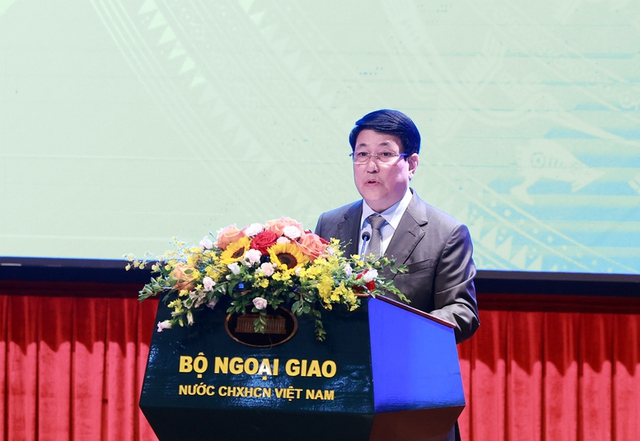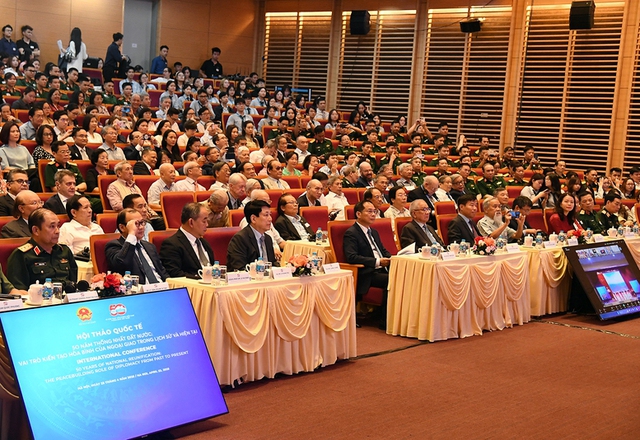President Luong Cuong highlights peacebuilding role of diplomacy in war and peacetime
VGP – The peace-building role of Vietnamese diplomacy has been demonstrated throughout historical periods, from the struggle for national liberation and reunification to building and developing the country in peacetime.

President Luong Cuong addresses the International Conference themed "50 years of national reunification: Peacebuilding role of diplomacy from past to present" in Ha Noi, April 23, 2025. Photo: VGP
President Luong Cuong highlights the role of diplomacy in the wartime and peacetime while delivering his keynote speech at the International Conference themed "50 years of national reunification: Peacebuilding role of diplomacy from past to present".
The conference, held in Ha Noi on April 23 on the occasion of the 50th anniversary of the liberation of the South and national unification (April 30, 1975-April 30, 2025), drew the participation of around 500 delegates, including Vietnamese and foreign diplomats, expersts and scholars.
Below are key points of President Luong Cuong's speech:
The peace-building role of Vietnamese diplomacy has been demonstrated throughout historical periods, from the struggle for national liberation and reunification to building and developing the country in peacetime.
First of all, the diplomatic sector mobilized enormous material and spiritual support from socialist countries and progressive peoples around the world, creating an unprecedented large international movement in support of the just struggle of the Vietnamese people.
Through the skillful diplomatic activities of President Ho Chi Minh and the leaders of Viet Nam, the Soviet Union, China, Laos, Cambodia, and socialist countries and international friends have offered their sincere and wholehearted support and assistance for the Vietnamese people. Millions of people, leaders and politicians such as Cuba's President Fidel Castro and Sweden's Prime Minister Olof Palme, to even American people took to the streets to protest the war of aggression. Along with our compatriots in the country, our overseas compatriots upheld their patriotism and participated in the resistance war in many ways. Many people volunteered to return to the homeland, contributing their knowledge and assets to save the country. In the history of the 20th, there have been few struggles of any nation that gathered such widespread and strong support both at home and abroad as our Vietnamese nation.
Secondly, the diplomatic sector has coordinated smoothly and closely with the military and political fronts, opening up a situation of "fighting and negotiating" at the same time, thereby gaining victory step by step, creating the premise to bring the cause of struggle and liberation of the South to complete victory. Great victories on the battlefields, especially the victory of "Ha Noi-Dien Bien Phu in the air" (December 1972), forced the U.S. to sign the Paris Agreement to end the war and restore peace in Viet Nam. The fierce intellectual battles at the negotiating table of the Geneva Conference in 1954 and the Paris Conference (from 1968 to 1973) of Vietnamese politicians and diplomats, notably comrades Pham Van Dong, Le Duc Tho, Nguyen Thi Binh, Nguyen Duy Trinh, Xuan Thuy, have gone down in history, affirming Viet Nam's mettle and intelligence, making the opponent respect. The Paris Agreement became the pinnacle of victory for Vietnamese diplomacy in the Ho Chi Minh era, completing a stage of the resistance war of fighting to make America go away. After the Paris Agreement was signed, the diplomatic sector continued to play an important role in promoting the parties to implement the Agreement, especially forcing the U.S. to withdraw its troops from Viet Nam, creating an important premise to overthrow the puppet regime on April 30, 1975, completely liberating the South and unifying the country.

Dignitaries and delegates to the International Conference themed "50 years of national reunification: Peacebuilding role of diplomacy from past to present". Photo: VGP
Thirdly, the diplomatic sector made significant contributions to national reconstruction, successful realization of the foreign policy during the Doi moi period, opening up an environment conducive to national construction and defense.
As the country was still engulfed in the smoke of bombs and bullets, President Ho Chi Minh affirmed: "We stand ready to roll out red carpet and scatter flowers for the U.S. to withdraw". Viet Nam's humane treatment of American prisoners of war, exchange of prisoners during the implementation of the Paris Agreement, and creation of favorable conditions for the U.S. side to evacuate citizens and military personnel, and cooperation in searching for missing Americans were among gestures of goodwill, creating the premise for both sides to resume the bridge of cooperation. Later, it was the American veterans who fought in Viet Nam like John MacCain and John Kerry who were active and proactive in promoting the normalization and developing relations with Viet Nam.
After April 30, 1975, the diplomatic sector continued to clarify the righteousness of Viet Nam's noble international mission to help the Cambodian people to escape the genocidal regime; gradually break the siege and embargo, contributing to help the country overcome socio-economic difficulties.
During the 40 years of Doi moi, the diplomatic sector has made many pratical contributions to the country's great achievements of historical significance. From a backward country heavily devastated by war, Viet Nam is now among top 35 leading economies in terms of GDP scale, and among top 20 leading economies in terms of international trade. From a besieged and isolated country, Viet Nam now has set up diplomatic relations with 194 countries. Thirty-four of them have established comprehensive partnership and strategic partnership with Viet Nam, including all permanent members of the United Nations Security Council, all G7 members, 18 out of 20 G20 economies, and all ASEAN Member States.
In the wartime, the primary task of diplomacy is to contribute to the struggle for national independence and unification. In the peacetime, the diplomatic sector takes the lead in creating peace, protecting the Fatherland early and from afar, expanding space for national development and strengthening friendship, equal and mutually beneficial cooperation between Viet Nam and other countries and international partners.
For international friends, the April 30, 1975 victory and the strong revival and development of Viet Nam represent a typical example of a resilient, indomitable, peace-loving and very humane nation.
The Party, State and people of Viet Nam always bear in mind and are deeply graceful for the support and companionship of friends and progressive peoples around the world, including American people, who stood side by side with the Vietnamese people in the struggle for peace and justice and the truth that nothing is more precious than independence and freedom.
Being deeply aware that the future and destiny of the country are closely linked to peace, stability, cooperation and development of the region and the world, Viet Nam will consistently pursue the foreign policy of independence, self-reliance, peace, friendship, cooperation and development, diversification and multi-lateralization of external relations, and its "four nos" defense policy; and is ready to actively and proactively contribute to the world politics, the global economy, and the human civilization./.

